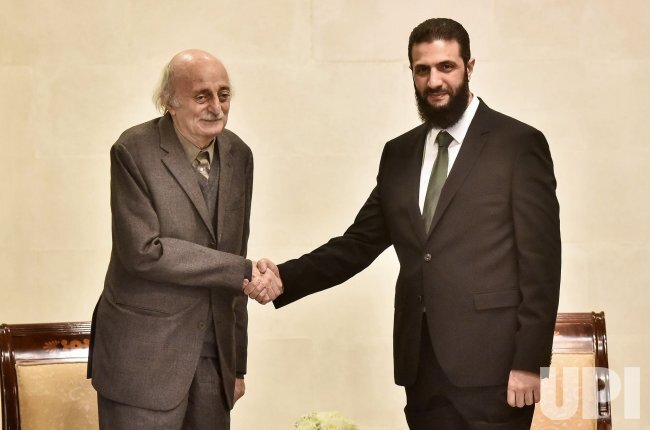By Sondoss Al Asaad

BEIRUT - For the first time after 13 years of estrangement, Walid Jumblatt, Lebanon’s Druze leader, visited Damascus on Sunday, December 22.
Jumblatt met Abu Muhammad al-Julani, currently known as “Ahmad al-Sharaa,” with a delegation of political and religious figures affiliated with Lebanon’s Progressive Socialist Party (PSP).
Sources close to the PSP stated that the priority of the visit was to reassure the concerns of Syria’s Druze minority, as al-Sharaa assured him of his “concern for all Syrian components and partnership.”
Al-Sharaa allegedly stated, “Islam does not mean the abolition of other sects, but on the contrary, we have a duty to protect them. Today, we are fulfilling the state’s duty in protecting all components of Syrian society.”
In light of the lack of clarity on the final formula of the ruling clique in Damascus, sources close to the PSP refused to consider that Jumblatt had been hasty, noting that he did not present himself as a representative of the Lebanese state.
The PSP sources further pointed out that the visit was constructive, especially since al-Sharaa seemed open and even keen to correct the “future relationship with Hezbollah,” as he indicated that “a page has been turned” and that the “Syria page is at an equal distance from all Lebanese forces,” according to the delegation accompanying Jumblatt.
In return, al-Sharaa pledged that the new regime in Syria will respect “Lebanon’s sovereignty, independence, territorial integrity, and security and stability,” and that it will stand at an equal distance from everyone.
Jumblatt proposed to al-Sharaa a draft memorandum of understanding that called for harmonious Lebanese-Syrian relations and called for “revealing the fate of Lebanese detainees in Syrian prisons.”
Al-Sharaa said, “Despite the past wounds, we will be a support for Lebanon and all components of the Lebanese people and we will build strategic relations.”
Regarding Lebanon’s Shiites, al-Sharaa explained, “whether opponents of the former regime or supporters” are “part of the Lebanese environment. Today, we speak with the logic of the state, separate from previous political classifications, which negatively affected the structure of Lebanon, Syria and the countries neighboring them.”
Jumblatt also told al-Sharaa, “The road is long, and we and you are suffering from Israeli expansion.”
Besides, he stressed the importance of demarcating the land borders with Lebanon and agreeing on the identity of the Shebaa Farms. Jumblatt said that if an agreement is reached on demarcation between the two countries, the fate of “the Shebaa Farms will be subject to international resolution 242… but the Shebaa Farms are Syrian.”
This statement angered the citizens of Shebaa, who criticized Jumblatt’s provocative position, stressing in a statement: “We have previously met with Mr. Jumblatt and other Lebanese leaders on more than one occasion and presented to them everything that confirms the Lebanese identity of the Shebaa Farms and Kfar Shuba Hills.”
The statement added: “We refer Mr. Jumblatt and others to Resolution 1701, which explicitly speaks about the Shebaa Farms and emphasizes Resolution 425 and never mentioned Resolution 242 regarding the Shebaa Farms.”
It further said: “How can the demarcation be carried out, which is already demarcated, in light of the expansion of the Zionist occupation inside Syrian territory?”
The statement was concluded by calling on Jumblatt to “remove this national file from private and narrow calculations because the concept of sovereignty is indivisible. We will remain committed to our rights and our land and work by all means to liberate it from the occupation.”

No comments:
Post a Comment